Karl Barth Collection (55 vols.)
Digital Logos Edition
Overview
Introducing Credo, Robert McAffee Brown notes that “the reader has the privilege of disagreeing with Barth. He no longer has the privilege of ignoring him.”
Perhaps the twentieth century’s most influential theologian, Karl Barth cannot be overlooked. This collection will prove an invaluable resource for scholars examining his theological development and the perfect access point for newcomers to Barth. Examine 18 of Barth’s shorter works on an array of subjects—from the church in wartime, to ethics, to Mozart. These shorter works offer compelling new insights for Barth enthusiasts as well as a springboard for studying the formidable Church Dogmatics, also included in this collection.
Church Dogmatics, Barth’s monumental life-work that consists of more than 6 million words, was written over the span of 35 years. In it, Barth covers in depth the great doctrines of the Word of God, God, Creation and Reconciliation. He made it his task “to take all that has been said before and to think it through once more and freshly to articulate it anew as a theology of the grace of God in Jesus Christ.” Two characteristics that define Barth’s theology are his emphasis on the person of Christ (Barth “works from Christ outward”) and his insistence that ethics and theology cannot be separated. Barth taught that “theology is ethics,” since knowing God entails doing his will.
Barth’s theology was shaped by his experience of living and teaching in Germany during the rise of Nazism. By 1934, Barth had become a leader in the Confessing Church movement, which stood in courageous opposition to Nazism at a time when the German Protestant church had largely endorsed National Socialism. This stand cost him his professorship at Bonn University and he was forced to flee the country in 1935.
Barth has been called neo-orthodox, evangelical, and Reformed. Indeed, his views developed remarkably over his lifetime as he moved from a liberal position to one of dialectical theology (theology founded on paradoxes or tensions). Later in life, Barth abandoned the views of Friedrich Schleiermacher, Rudolf Bultmann, and the liberal tradition. He argued that God was not made in man’s image but is instead “Wholly Other.”
Barth is probably best described as “ecumenical” since his work is read by Protestants and Roman Catholics, mainstream and evangelicals. Indeed, Barth was described by Pope Pius XII as the most important theologian since Thomas Aquinas, and his work continues to be a major influence on students, scholars and preachers today.
This product is not longer available for purchase, but check out the updated Select Works of Karl Barth (42 vols.).
- Provides one the most comprehensive libraries of Barth’s work ever created
- Offers lesser known works as well as Barth’s timeless Church Dogmatics
[Barth] undoubtedly is one of the giants in the history of theology.
—Christianity Today
- Title: Karl Barth Collection
- Author: Karl Barth
- Volumes: 55
- Pages: 13,542
- Christian Group: Reformed
- Topic: Theology, Biblical Studies, Systematic Theologies
Individual Titles
- Christ and Adam
- Come, Holy Spirit
- Community, State, and Church
- Credo
- Ethics
- Final Testimonies
- Fragments Grave and Gay
- God In Action
- The Church and the War
- The Faith of the Church: A Commentary on the Apostles’ Creed According to Calvin’s Catechism
- The Great Promise: Luke 1
- The Knowledge of God and the Service of God According to the Teaching of the Reformation
- The Resurrection of the Dead
- The Teaching of the Church Regarding Baptism
- Theological Existence To-Day! A Plea for Theological Freedom
- Theology and Church: Shorter Writings, 1920–1928
- Witness to the Word: A Commentary on John 1
- Wolfgang Amadeus Mozart
- Church Dogmatics, Volume 1: The Doctrine of the Word of God, Part 1
- Church Dogmatics, Volume 1: The Doctrine of the Word of God, Part 2
- Church Dogmatics, Volume 2: The Doctrine of God, Part 1
- Church Dogmatics, Volume 2: The Doctrine of God, Part 2
- Church Dogmatics, Volume 3: The Doctrine of Creation, Part 1
- Church Dogmatics, Volume 3: The Doctrine of Creation, Part 2
- Church Dogmatics, Volume 3: The Doctrine of Creation, Part 3
- Church Dogmatics, Volume 3: The Doctrine of Creation, Part 4
- Church Dogmatics, Volume 4: The Doctrine of Reconciliation, Part 1
- Church Dogmatics, Volume 4: The Doctrine of Reconciliation, Part 2
- Church Dogmatics, Volume 4: The Doctrine of Reconciliation, Part 3.1
- Church Dogmatics, Volume 4: The Doctrine of Reconciliation, Part 3.2
- Church Dogmatics, Volume 4: The Doctrine of Reconciliation, Part 4
- Church Dogmatics, Volume 5: Index, with Aids for the Preacher
- A Unique Time of God: Karl Barth's WWI Sermons
- Insights: Karl Barth's Reflections on the Life of Faith
- Barth in Conversation, Volume 1: 1959-1962
- Fifty Prayers
- Church Dogmatics
- The Word of God and Theology
This title is included in the following collections
You can save when you purchase this product as part of a collection.
Select Works of Karl Barth (42...
$897.58$434.99The Life, Thought, and Works o...
$1,842.09$824.99Logos 9 Reformed Portfolio Leg...
$4,749.99$4,749.99Logos 9 Ultimate Legacy Librar...
$24,999.99$24,999.99
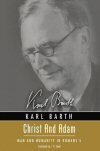
In this essay, Barth discusses the relationship between Christ and Adam as understood by Paul. Moving beyond traditional exegetical and theological scholarship done on Romans 5, Barth offers an entirely new interpretation of the concept of humanity presented in Paul’s view of the Christ-Adam relationship. A valuable contribution to the interpretation of Romans 5, ‘Christ and Adam’ is also an example of Barth’s exegetical method and provides insight into his broader theological project.
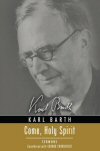
“These sermons were prepared from 1920 to 1924. Professor Barth preached some of them while he was minister of the Reformed congregation in Safenwil, Canton Aargau, Switzerland; others in the Reformed Church in Goettingen while he was professor of theology in the University. Pastor Thurneysen at that time preached to the congregation in Bruggen, near St. Gall, Switzerland. The sermons were written not for special occasions but for the regular Sunday morning service, and were addressed to such men and women as one will find in any village or city church—to men and women in the struggle for life, waiting and seeking for God. Pastor Thurneysen selected the sermons and arranged them according to a scheme that may be indicated by the words Promise, Christ, Christian Living.” (from the Translator’s Preface)
Eduard Thurneysen (1888–1974) was a Swiss Protestant theologian and pastor, and close friend of Karl Barth. Thurneysen and Barth worked together developing dialectical theology. Thurneysen later became professor of theology at Zurich. He also wrote A Theology of Pastoral Care and The Sermon on the Mount.
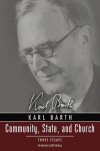
Karl Barth was a modern master theologian. Whenever men in the past generation have reflected deeply on the ultimate problems of life and faith, they have done so in a way that bears the mark of the intellectual revolution let loose by this Swiss thinker.
But his life was not simply one of quiet reflection and scholarship. He was obliged to do his thinking and writing in one of the stormiest periods of history, and he always attempted to speak to the problems and concerns of the time. In June 1933 he emerged as the theologian of the Confessional movement, which was attempting to preserve the integrity of the Evangelical Church in Germany against corruption from within and terror from without. His leadership in this struggle against Nazism also made it necessary for him to say something about the totalitarianism that the Soviet power was clamping down upon a large part of Europe. In this indirect way, a Barthian social philosophy emerged, and this theologian, who abjured apologetics and desired nothing but to expound the Word of God, was compelled by circumstances to propound views on society and the state that make him one of the most influential social thinkers of our time.
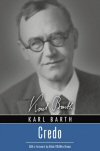
This important book, by the twentieth century’s preeminent Christian theologian, explains the Apostle’s Creed as a foundation of the Christian religion. More accessible than some of Karl Barth’s other works, it provides an entry point into the thinking of Barth for all readers. In the foreword, Robert McAffee Brown notes that “it is little short of amazing, reading Credo in light of the full Church Dogmatics, how much of the latter is here in nuce in this small book. The dissatisfaction with ‘natural theology,’ the centrality of Christology, the sheer ‘givenness’ of the gift of grace to the undeserving . . . these and other themes that Church Dogmatics spells out over hundreds of pages, confront us here in a paragraph, a page, a chapter, in such a way that we discover that for Barth the tasks of exegete and preacher, scholar and proclaimer, teacher and witness, are all combined in one vocation.”

Originally published in German in an edition edited by Dietrich Braun, Karl Barth’s Ethics is at last available in English. This volume, containing lectures given as courses at the University at Munster in 1928 and 1929, represents Barth’s first systematic attempt at a theological account of Christian ethics.
Although composed over 50 years ago, just prior to Barth’s 30-year devotion to Church Dogmatics, many of its themes, problems, and conclusions are astonishingly relevant today (his critique of competitiveness and of technology, for example). While this work is concerned with the foundations of ethics, it also reveals Barth’s highly practical interest in ethics and his special concern to avoid legalism and yet to maintain a structured divine command.
Barth’s ethics are arranged on a Trinitarian basis, dealing in succession with the command of God the Creator (life), the command of God the Reconciler (law), and the command of God the Redeemer (promise).
It is then a work of the greatest interest showing the development of Barth through the liberal period of thought toward a more positive and theologically grounded ethic, which he later developed under the rubric of the command of God.
—Thomas F. Torrance, emeritus professor of Christian dogmatics, University of Edinburgh.

Containing a fragment left unfinished from then night he died, the five brief pieces collected here represent the final words prepared by Karl Barth for publication during his final months. He writes: “The last word that I have to say as a theologian or politician is not a concept like grace but a name: Jesus Christ. He is grace and he is the ultimate one beyond world and church and even theology. We cannot lay hold of him. But we have to do with him. . . . There is no salvation but in this name. In him is grace.”
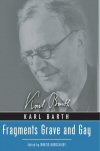
Karl Barth was one of the intellectual giants of the twentieth century. Pope Pius XI called him the greatest theologian since Saint Thomas Aquinas. But he was also a popular preacher in Basel, and the author of the formidable Church Dogmatics had a lighter touch as well. This is revealed in this engaging collection of fragments. Not only do they capture the gaiety and gravity of Barth in a simple and homely style; they also contain, in a delightfully digestible form, the essence of what he had to say about the Bible, theology, and the task of Christians in the modern world.
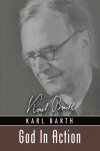
In this series of lectures delivered in the period immediately preceding World War II, Barth addresses the major topics of systematic theology. The reader gets a glimpse of the depth of Barth’s thinking in these brief discourses, which he expanded upon greatly in his major work, Church Dogmatics. In an appendix, Barth answers question from the audience regarding the last essay.
Contents:
- Revelation
- The Church
- Theology
- The Ministry of the Word
- The Christian as Witness
- Appendix
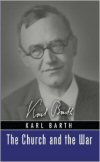
A member of the Confessing Church, and primary author of the Barmen Declaration, Karl Barth was a prominent voice of opposition to Nazism in the church. Barth wrote a number of letters addressing different groups of Christians, in the wake of various events connected with World War II. This volume presents Barth’s 1942 letter to American Christians, addressing the proper function of the church in relation to the war and addressing those that deal with the responsibility of the church in post-war reconstruction. Also included are some remarks also written specifically for American Christians, which as Samuel McCrea Cavert notes in the introduction, present “a review of the way in which the Protestant churches of Europe had met the crisis of National Socialism and the war up to the fall of 1942. . . . significant for its indirect disclosure of Dr. Barth’s judgments on the elements of strength and weakness in the churches of Europe.”
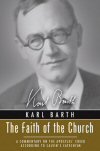
The Apostles’ Creed presents the foundation of Christian faith. The interpretive version of the Apostles’ Creed formulated by the Swiss reformer John Calvin in his catechism has been the basis of Protestant theological education for centuries. In The Faith of the Church, Karl Barth—one of the powerful and enduring theologians of modern Protestantism—reinterprets the Apostles’ Creed according to Calvin’s catechism.
Barth’s theology has been a mobilizing influences of modern religious thought. Repudiating every theological accent which permits man either self-sufficiency or independence from the action and grace of God, Barth takes seriously the meaning of the catechism—which is to direct man to the knowledge of God. His interpretations of the catechism, organized according to the Catechism’s questions, are unimpaired by technical language or jargon. They are direct, moving, and exceedingly penetrating. This is not a work to employ the attentions of those indifferent to the heart of Christian faith. It is a work calculated, however, to disturb and deepen the faith of those who imagine themselves already Christian.

The Great Promise gives a powerful exegesis of the first chapter of the Gospel of Luke which tells the story of the Advent—focusing on the birth of John the Baptist in preparation for the birth of Christ. It consists of four stenographically recorded biblical lectures which Karl Barth gave to his theology students during Advent in 1934, after his lectures at the University of Bonn had been suspended by the Nazi regime.
Uncovering what he calls “the spiritual birth story of John the Baptist,” Barth proclaims it to be the spiritual birth story of anyone who knows himself to be standing under God. His biblical account is thus interwoven with a continuous reference to the way in which God acts upon the world today no less than in the past and how humans may or may not submit to such acting.
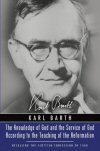
This volume presents Karl Barth’s lectures as part of the prestigious Gifford lectureship in which he focuses on the knowledge and service of God, relating particularly to the 1560 Scottish Reformation. He notes: “These lectures on that teaching [of the Reformed church on natural theology] will not take the form of an independent outline, but will be connected with a ‘document’ of the Reformation. Further, taking into account the specifically Scottish character of the Gifford foundation, this document will be a document of the ‘Scottish’ Reformation. . . . I am letting John Knox and his friend speak in their Confessio Scotica of 1560. This is not to take the form of an historical analysis of the Scottish Confession, but that of a theological paraphrase and elucidation of the document as it speaks today and as we today by a careful objective examination of its content can hear it speak.”
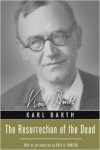
Karl Barth saw Chapter 15 as the center of 1 Corinthians, arguing that a misunderstanding of the resurrection underlies all the problems in Corinth. In this volume, he develops his view of biblical eschatology, asserting that chapter 15 is key to understanding the testimony of the New Testament. Barth understood the “last things” not as an end to history but as an “end-history” with which any period is faced.
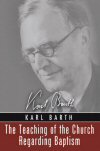
This volume contains a lecture given by Karl Barth to a group of Swiss theological students in 1943, in which he presents his thoughts on baptism, gleaned from his study of the New Testament. He discusses the power, meaning, and efficacy of baptism in its biblical and theological context.
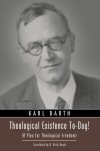
Written in light of the growing threat of Nazism in Germany, Theological Existence To-Day! calls the Church to remember the critical importance of allowing only the sovereign rule of Scripture in its affairs. Karl Barth presents his thoughts on the situation in regards to the Third Reich and German churches, calling for the freedom of theological thought and opposing the government’s attempt to control the Church. His work offers valuable examination of the attitudes present in German churches at the time, and a window into understanding the church situation at that historic place and time.
In 1933, the very year Hitler came to power in Germany, Karl Barth wrote Theological Existence To-Day! to take his stand against state control of the German church. Many believe this book began the fateful struggle for a Confessing Church.
—James W.M. McClendon Jr., Convictions: Defusing Religious Relativism
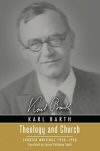
Examine a collection of Karl Barth’s shorter works, written after the first publication of his Epistle to the Romans, during his time as professor in Göttingen and Münster, in the wake of World War I.
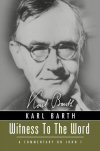
Karl Barth’s lectures on the first chapter of the Gospel of John, delivered at Muenster in 1925–1926 and at Bonn in 1933, came at an important time in his life, when he was turning his attention more fully to dogmatics. Theological interpretation was thus his primary concern, especially the relation between revelation and the witness to revelation, which helped to shape his formulation of the role of the written (and spoken) word vis-a-vis the incarnate Word.
The text is divided into three sections—John 1:1–18, 19–34, 35–51, with the largest share of the book devoted to the first section. Each section begins with Barth’s own translation, followed by verse-by-verse and phrase-by-phrase commentary on the Greek text. Although Barth’s interpretation is decidedly theological, he does take up questions of philology and textual criticism more thoroughly than in his other works.
Much has happened in Johannine scholarship since these lectures were first delivered, yet they remain valuable today—100 years after Barth’s birth—both for their insights into the gospel and into Karl Barth.
Witness to the Word is an important exposition in its own right, as well as a clue to Barth’s development as a theologian. I was struck, first, by Barth’s meticulous attention to exegetical detail, in dialogue with the best available scholarship; and, second, by the foundational character of this exposition for the doctrine of the Word of God he developed later in his ‘Dogmatics.’
—John D. Godsey, former professor of systematic theology, Wesley Theological Seminary

“Barth was sometimes asked if his theology demanded a different master in music than Mozart. Barth’s response noted in this volume was emphatically, and characteristically to some, negative—Nein. Regardless of what one makes of Mozart, or of Barth’s view of him . . . the reader gains a greater understanding of Barth’s theology through attention to his reflections on Mozart. For ‘the evangelical Christian,’ Barth’s fascination with the ‘Catholic’ and ‘Freemason’ Mozart was by no means an anomaly that strikes a dissonant chord in Barth’s theological symphony. Rather, it resonates with the melodic line. Like a magic flute, Barth’s tribute to Mozart serves as a key to unlocking the door to the mysteries of Barth’s view of God’s ways with the world.” (from the foreword by Paul Louis Metzger)
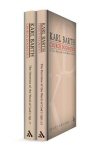
Church Dogmatics, Volume 1: The Doctrine of the Word of God, Part 1
- Author: Karl Barth
- Editors: Thomas F. Torrance and Geoffrey Bromiley
- Publisher: T&T Clark
- Publication Date: 2004
- Pages: 528
Karl Barth, who lived from 1886–1968, was perhaps the most influential theologian of the 20th century. Church Dogmatics, Barth’s monumental life-work that consists of more than 6 million words, was written over the span of 35 years. In it, Barth covers in depth the great doctrines of the Word of God, God, Creation and Reconciliation. He made it his task “to take all that has been said before and to think it through once more and freshly to articulate it anew as a theology of the grace of God in Jesus Christ.” Two characteristics that define Barth’s theology are his emphasis on the person of Christ (Barth “works from Christ outward”) and his insistence that ethics and theology cannot be separated. Barth taught that “theology is ethics,” since knowing God entails doing his will.
Barth’s theology was shaped by his experience of living and teaching in Germany during the rise of Nazism. By 1934, Barth had become a leader in the Confessing Church movement, which stood in courageous opposition to Nazism at a time when the German Protestant church had largely endorsed National Socialism. This stand cost him his professorship at Bonn University and he was forced to flee the country in 1935.
Barth has been called neo-orthodox, evangelical, and Reformed. Indeed, his views developed remarkably over his lifetime as he moved from a liberal position to one of dialectical theology (theology founded on paradoxes or tensions). Later in life, Barth abandoned the views of Friedrich Schleiermacher, Rudolf Bultmann, and the liberal tradition. He argued that God was not made in man’s image but is instead “Wholly Other.”
Barth is probably best described as “ecumenical” since his work is read by Protestants and Roman Catholics, mainstream and evangelicals. Indeed, Barth was described by Pope Pius XII as the most important theologian since Thomas Aquinas, and his work continues to be a major influence on students, scholars and preachers today.
Volume 1, Part 1 covers topics such as the task of dogmatics, the Word of God as the criterion of dogmatics, and the revelation of God in the Trinity.
Contains:
- The Doctrine of the Word of God I.1 §1–7
- The Doctrine of the Word of God I.1 §8–12
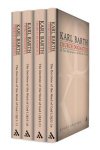
Church Dogmatics, Volume 1: The Doctrine of the Word of God, Part 2
- Author: Karl Barth
- Editors: Thomas F. Torrance and Geoffrey Bromiley
- Publisher: T&T Clark
- Publication Date: 2004
- Pages: 928
Volume 1, Part 2 covers topics such as the revelation of God in the Word, the outpouring of the Holy Spirit, the authority and freedom of Scripture in the Church, and the proclamation of the Church.
Contains:
- The Doctrine of the Word of God I.2 §13–15
- The Doctrine of the Word of God I.2 §16–18
- The Doctrine of the Word of God I.2 §19–21
- The Doctrine of the Word of God I.2 §22–24

Church Dogmatics, Volume 2: The Doctrine of God, Part 1
- Author: Karl Barth
- Editors: Thomas F. Torrance and Geoffrey Bromiley
- Publisher: T&T Clark
- Publication Date: 2004
- Pages: 712
The two-part Doctrine of God is volume 2 of Barth’s Church Dogmatics. In it, Barth discusses the balance between the knowability and hiddenness of God, the perfections and traits of God, the will of God as demonstrated in the election of Christ, and the election of the individual. This volume digs into some of the most difficult and important doctrines of Christianity. Pastors, scholars, and students of doctrine will find this set to be invaluable in their understanding of God.
Volume 2, Part 1 covers topics such as the knowledge of God, the knowability of God, the reality of God, and the perfections of God.
Contains:
- The Doctrine of God II.1 §25–27
- The Doctrine of God II.1 §28–30
- The Doctrine of God II.1 §31
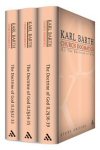
Church Dogmatics, Volume 2: The Doctrine of God, Part 2
- Author: Karl Barth
- Editors: Thomas F. Torrance and Geoffrey Bromiley
- Publisher: T&T Clark
- Publication Date: 2004
- Pages: 832
The two-part Doctrine of God is volume 2 of Barth’s Church Dogmatics. In it, Barth discusses the balance between the knowability and hiddenness of God, the perfections and traits of God, the will of God as demonstrated in the election of Christ, and the election of the individual. This volume digs into some of the most difficult and important doctrines of Christianity. Pastors, scholars, and students of doctrine will find this set to be invaluable in their understanding of God.
Part 2 covers topics such as the election of God, the election of Jesus Christ, and the command of God as the claim, decision, and judgment of God.
Contains:
- The Doctrine of God II.2 §32–33
- The Doctrine of God II.2 §34–35
- The Doctrine of God II.2 §36–39
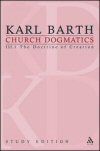
Church Dogmatics, Volume 3: The Doctrine of Creation, Part 1
- Author: Karl Barth
- Editors: Thomas F. Torrance and Geoffrey Bromiley
- Publisher: T&T Clark
- Publication Date: 2004
- Pages: 448
The four-part Doctrine of Creation is volume 3 of Barth’s Church Dogmatics. In it, Barth discusses creation and covenant, man as the creature of God, the soul and body of man, the kingdom of heaven and God’s divine rule, and man’s freedom. Barth takes his time, addressing details which comprise the very basis of life as a creation of God and a Christian. Pastors, scholars, and students of doctrine will find this set to be invaluable in their understanding of the heavens, the earth, and their place in creation.
Part 1 covers topics such as creation history, creation as the external basis of the covenant, the covenant as the internal basis of creation, and creation as benefit, actualization, and justification.
Contains:
- The Doctrine of Creation III.1 §40–42

Church Dogmatics, Volume 3: The Doctrine of Creation, Part 2
- Author: Karl Barth
- Editors: Thomas F. Torrance and Geoffrey Bromiley
- Publisher: T&T Clark
- Publication Date: 2004
- Pages: 688
The four-part Doctrine of Creation is volume 3 of Barth’s Church Dogmatics. In it, Barth discusses creation and covenant, man as the creature of God, the soul and body of man, the kingdom of heaven and God’s divine rule, and man’s freedom. Barth takes his time, addressing details which comprise the very basis of life as a creation of God and a Christian. Pastors, scholars, and students of doctrine will find this set to be invaluable in their understanding of the heavens, the earth, and their place in creation.
Part 2 covers topics such as man as a problem of dogmatics, man as the creature of God, man in his determination as the covenant-partner of God, man as soul and body, and man in his time.
Contains:
- The Doctrine of Creation III.2 §43–44
- The Doctrine of Creation III.2 §45–46
- The Doctrine of Creation III.2 §47

Church Dogmatics, Volume 3: The Doctrine of Creation, Part 3
- Author: Karl Barth
- Editors: Thomas F. Torrance and Geoffrey Bromiley
- Publisher: T&T Clark
- Publication Date: 2004
- Pages: 560
The four-part Doctrine of Creation is volume 3 of Barth’s Church Dogmatics. In it, Barth discusses creation and covenant, man as the creature of God, the soul and body of man, the kingdom of heaven and God’s divine rule, and man’s freedom. Barth takes his time, addressing details which comprise the very basis of life as a creation of God and a Christian. Pastors, scholars, and students of doctrine will find this set to be invaluable in their understanding of the heavens, the earth, and their place in creation.
Part 3 covers topics such as the doctrine of providence, God the Father as Lord of his creature, God and nothingness, and the Kingdom of Heaven.
Contains:
- The Doctrine of Creation III.3 §48–49
- The Doctrine of Creation III.3 §50–51

Church Dogmatics, Volume 3: The Doctrine of Creation, Part 4
- Author: Karl Barth
- Editors: Thomas F. Torrance and Geoffrey Bromiley
- Publisher: T&T Clark
- Publication Date: 2004
- Pages: 720
The four-part Doctrine of Creation is volume 3 of Barth’s Church Dogmatics. In it, Barth discusses creation and covenant, man as the creature of God, the soul and body of man, the kingdom of heaven and God’s divine rule, and man’s freedom. Barth takes his time, addressing details which comprise the very basis of life as a creation of God and a Christian. Pastors, scholars, and students of doctrine will find this set to be invaluable in their understanding of the heavens, the earth, and their place in creation.
Part 4 covers topics such as ethics as a task of the doctrine of creation, freedom before God, freedom in fellowship, freedom for life, and freedom in limitation.
- The Doctrine of Creation III.4 §52–54
- The Doctrine of Creation III.4 §55–56
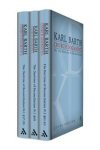
Church Dogmatics, Volume 4: The Doctrine of Reconciliation, Part 1
- Author: Karl Barth
- Editors: Thomas F. Torrance and Geoffrey Bromiley
- Publisher: T&T Clark
- Publication Date: 2004
- Pages: 816
The five-part Doctrine of Reconciliation is volume 4 of Barth’s Church Dogmatics. In it, Barth discusses the fulfillment of the covenant, the justification and sanctification of man, the work of the Holy Spirit in the Christian community, the foundations of the Christian life, and the grace of God. Pastors, scholars, and students of doctrine will find this set to be invaluable in their understanding of God’s work as the reconciler.
Part 1 covers topics such as the subject-matter and problems of the doctrine of reconciliation, and Jesus Christ the Lord as servant.
Contains:
- The Doctrine of Reconciliation IV.1 §57–59
- The Doctrine of Reconciliation IV.1 §60
- The Doctrine of Reconciliation IV.1 §61–63
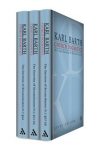
Church Dogmatics, Volume 4: The Doctrine of Reconciliation, Part 2
- Author: Karl Barth
- Editors: Thomas F. Torrance and Geoffrey Bromiley
- Publisher: T&T Clark
- Publication Date: 2004
- Pages: 896
The five-part Doctrine of Reconciliation is volume 4 of Barth’s Church Dogmatics. In it, Barth discusses the fulfillment of the covenant, the justification and sanctification of man, the work of the Holy Spirit in the Christian community, the foundations of the Christian life, and the grace of God. Pastors, scholars, and students of doctrine will find this set to be invaluable in their understanding of God’s work as the reconciler.
Part 2 covers topics such as the exaltation of the Son of Man, the sloth and misery of man, the sanctification of man, the Holy Spirit and the upbuilding of the Christian community, and the Holy Spirit and Christian love.
Contains:
- The Doctrine of Reconciliation IV.2 §64
- The Doctrine of Reconciliation IV.2 §65–66
- The Doctrine of Reconciliation IV.2 §67–68
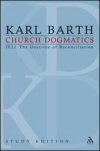
Church Dogmatics, Volume 4: The Doctrine of Reconciliation, Part 3.1
- Author: Karl Barth
- Editors: Thomas F. Torrance and Geoffrey Bromiley
- Publisher: T&T Clark
- Publication Date: 2004
- Pages: 496
The five-part Doctrine of Reconciliation is volume 4 of Barth’s Church Dogmatics. In it, Barth discusses the fulfillment of the covenant, the justification and sanctification of man, the work of the Holy Spirit in the Christian community, the foundations of the Christian life, and the grace of God. Pastors, scholars, and students of doctrine will find this set to be invaluable in their understanding of God’s work as the reconciler.
Part 3.1 covers topics such as Jesus Christ, the true witness, the glory of the mediator, and the falsehood and condemnation of man.
Contains:
- The Doctrine of Reconciliation IV.3.1 §69
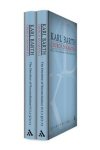
Church Dogmatics, Volume 4: The Doctrine of Reconciliation, Part 3.2
- Author: Karl Barth
- Editors: Thomas F. Torrance and Geoffrey Bromiley
- Publisher: T&T Clark
- Publication Date: 2004
- Pages: 496
The five-part Doctrine of Reconciliation is volume 4 of Barth’s Church Dogmatics. In it, Barth discusses the fulfillment of the covenant, the justification and sanctification of man, the work of the Holy Spirit in the Christian community, the foundations of the Christian life, and the grace of God. Pastors, scholars, and students of doctrine will find this set to be invaluable in their understanding of God’s work as the reconciler.
Part 3.2 covers topics such as the vocation of man, the Holy Spirit and the sending of the Christian community, and the Holy Spirit and Christian hope.
Contains:
- The Doctrine of Reconciliation IV.3.2 §70–71
- The Doctrine of Reconciliation IV.3.2 §72–73
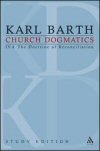
Church Dogmatics, Volume 4: The Doctrine of Reconciliation, Part 4
- Author: Karl Barth
- Editors: Thomas F. Torrance and Geoffrey Bromiley
- Publisher: T&T Clark
- Publication Date: 2004
- Pages: 240
The five-part Doctrine of Reconciliation is volume 4 of Barth’s Church Dogmatics. In it, Barth discusses the fulfillment of the covenant, the justification and sanctification of man, the work of the Holy Spirit in the Christian community, the foundations of the Christian life, and the grace of God. Pastors, scholars, and students of doctrine will find this set to be invaluable in their understanding of God’s work as the reconciler.
Part 4 covers topics such as the foundation of the Christian life, baptism with the Holy Spirit, and baptism with water.
Contains:
- The Doctrine of Reconciliation IV.4
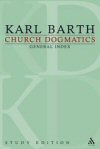
Church Dogmatics, Volume 5: Index, with Aids for the Preacher
- Author: Karl Barth
- Editors: Thomas F. Torrance and Geoffrey Bromiley
- Publisher: T&T Clark
- Publication Date: 2004
- Pages: 576
Karl Barth, who lived from 1886–1968, was perhaps the most influential theologian of the 20th century. Church Dogmatics, Barth’s monumental life-work that consists of more than 6 million words, was written over the span of 35 years. In it, Barth covers in depth the great doctrines of the Word of God, God, Creation and Reconciliation. He made it his task “to take all that has been said before and to think it through once more and freshly to articulate it anew as a theology of the grace of God in Jesus Christ.” Two characteristics that define Barth’s theology are his emphasis on the person of Christ (Barth “works from Christ outward”) and his insistence that ethics and theology cannot be separated. Barth taught that “theology is ethics,” since knowing God entails doing his will.
Contains:
- Index

World War I changed Karl Barth's theology forever. In this book William Klempa presents for the first time in English thirteen sermons that offer Barth's unique view and commentary on the Great War. Barth saw the war as “a unique time of God,” believing it to represent God's judgment on militarism. The sermons reveal a deep strain of theological wrestling with the war's meaning, as Barth comes to see the conflict as the logical outcome of all human attempts to create God in our own image. As it demonstrates a decisive shift in Barth's early theology, this volume is essential for anyone who wishes to understand the twentieth century's greatest theologian.
William Klempa's translation of Karl Barth's Safenwil sermons at the outbreak of World War I, accompanied by a very fine introduction that sets the historical and theological context, represents the culmination of a careful, critically appreciative, and lifelong engagement by Klempa with Barth's theology. All readers of Barth are indebted to Klempa, a seasoned interpreter of Barth, for making a new English translation of this important part of the Barth corpus available.
—John A. Vissers, professor of historical theology, Knox College, University of Toronto

This collection of short passages from the writings of Karl Barth reflects on the life of Christian faith. These one-page selections capture the vibrancy of Barth's faith, communicating his sense of wonder and excitement. Each piece is related to a verse of Scripture, making this an ideal book for daily devotional reading and a variety of other occasions.

Karl Barth is widely regarded as the most important theologian of the twentieth century, and his observations about the church and its place in a modern world continue to engage religious scholars nearly fifty years after his death. This English translation of the Swiss-published Conversations is a three-volume collection featuring correspondence, articles, interviews, and other short-form writings by Barth from 1959–1962. Among them are dialogues with representatives of the Evangelical Community Movement (1959); conversations with prison chaplains and a question-and-answer session with the Conference of the World Student Christian Federation (1960); discussions with Methodist preachers, Zurich pastors, and Catholic students of theology (1961); press conferences in New York and Chicago (1962); and an interview at the United Nations (1962). Within these pages, scholars and students will find a comprehensive view into Barth’s life and thinking about theology and its role in society today.

This collection for the first time makes Karl Barth's pastoral prayers available to an English-speaking audience, offering a fresh perspective on how the great Swiss theologian understood this central practice of Christian life. The prayers are organized according to seasons of the liturgical year, making them ideal for both group use and individual reflection.

Karl Barth's monumental work, Church Dogmatics, is recognized as a landmark in Protestant theology—perhaps the most important work of this century. However, the size range of its fourteen volumes has meant that its content and significance may not be so widely known or appreciated as it deserves. In this concise introduction, Helmut Gollwitzer provides a selection of some of the most important passages from Church Dogmatics to help the busy student explore the heart of the great work; or perhaps to direct a student to parts of the Dogmatics of greatest interest.
Helmut Gollwitzer (1908 – 1993) was a Protestant theologian and author. Born in Pappenheim, Bavaria, Gollwitzer studied Protestant theology in Munich, Erlangen, Jena and Bonn; he later completed a doctorate under Karl Barth in Basel, writing on the understanding of the Eucharist in Martin Luther and John Calvin.

The Word of God and Theology
- Author: Karl Barth
- Editor: Amy Marga
- Translator: Amy Marga
- Publisher: T&T Clark
- Publication Date: 2011
- Pages: 256
This classic volume of Barth’s essays was first published in 1924 under the title Das Wort Gottes und die Theologie. In this brand new English edition, along with each chapter, the entire critical apparatus is translated, including an explanatory passage giving general historical context and details of Barth’s own biography. These essays represent the very best of Barth’s work. Far from being superseded by the Church Dogmatics, this resource provides helpful insight into Barth’s theology.
Karl Barth (1886–1968), a Swiss Protestant theologian and pastor, was one of the leading thinkers of twentieth-century theology, described by Pope Pius XII as the most important theologian since Thomas Aquinas. He helped to found the Confessing Church and his thinking formed the theological framework for the Barmen Declaration. He taught in Germany, where he opposed the Nazi regime. In 1935, when he refused to take the oath of allegiance to Adolf Hitler, he was retired from his position at the University of Bonn and deported to Switzerland. There he continued to write and develop his theology.
Barth’s work and influence resulted in the formation of what came to be known as neo-orthodoxy. For Barth, modern theology, with its assent to science, immanent philosophy, and general culture and with its stress on feeling, was marked by indifference to the word of God and to the revelation of God in Jesus, which he thought should be the central concern of theology.